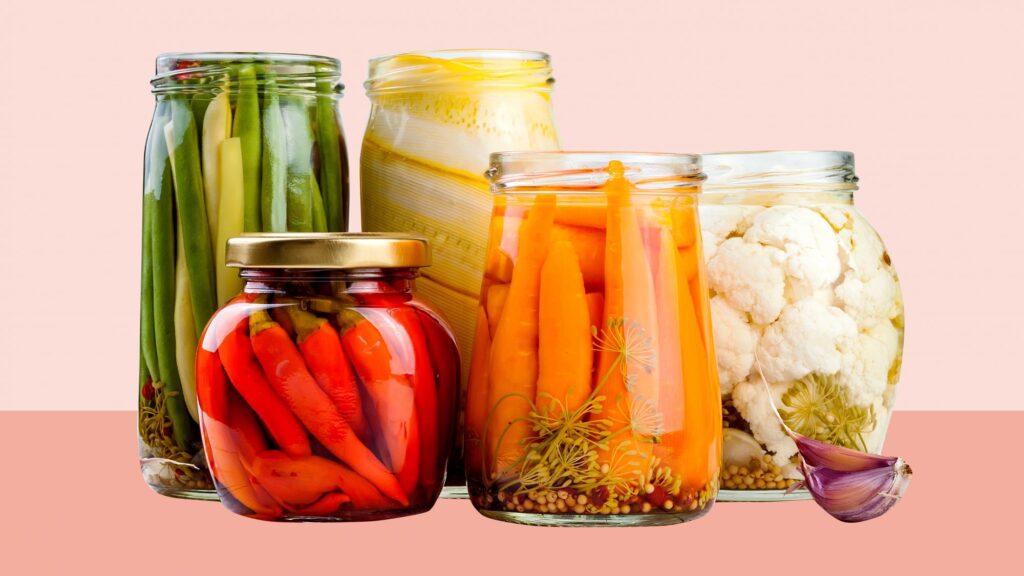Fermented foods are an old way of preservation and they change the nutritional value. Foods that are fermented are rich in probiotic bacteria and prove beneficial for a person’s overall health. The history of fermentation dates back to 7000-6600 BCE in China, where they made alcoholic beverages from fruits, rice, and honey. When foods are fermented, it transforms yeast and glucose into ethanol and increases the shelf life.
Historical evidence suggests that winemaking dates back to 6000 BCE in Georgia. However, this is not the only place where people were fermenting beverages. Citizens of Babylon have documented evidence that speaks of fermenting foods way back in 3000 BCE. Etymologically speaking, the word fermentation originates from the Latin word fervere, which means to boil. This refers to the process of fruits converting from their original form by the action of yeast.
1. Not All Fermented Foods Are the Same

We all know that fermented foods are great for our health. However, this does not mean that all fermented foods are great for your health. If you buy fermented foods from a store, you should look for the tell-tale signs like the bubbles in the liquid or a label that says naturally fermented. Most fermented food sellers like gutsyferments.com.au have a detailed description of how they ferment their foods. Besides reading the description, check for their authenticity by looking for reviews.
This is because research suggests that only those naturally fermented foods like yogurt and pickled vegetables are healthy, and are a healthy choice. Foods that are fermented artificially using vinegar and other substitutes do not offer any health benefits. This is because artificial fermentation does not lead to probiotics and that means, your body does not reap the benefits of consuming fermented foods. Instead of boosting your health, it could leave you with undesirable side effects. So, always be cautious of what you buy.
2. Improves Gut Health and Boosts Digestion

Naturally fermented foods improve digestive and gut health. It boosts the gut microbiome or the bacteria that live in our digestive tract. The microorganisms in a person’s gut have the solution to everything from obesity to neurodegenerative diseases. This means that it is important to ensure that we take care of our gut health.
The healthy probiotics also improve digestion. The best way to ensure that your gut health is taken care of is by getting some pickled vegetables, which you could make at home with ease. It would last a few months in your refrigerator and ensure that every meal you consume is tasty and healthy.
Our body needs food to generate energy, and there’s no news about that. But did you know that our body is not capable of digestion by itself? It needs the help of good bacteria to ensure that the food is broken down into digestible components by breaking down the complex carbohydrates.
So, every time you consume insoluble foods like whole grains, it is important to consume some soluble fiber like beans and oats or fermented food to ensure that it is easily digested. The good bacteria decreases the pH content in your intestine through acidic fermentation, which destroys the pathogenic bacteria. This ensures that the everything you consume is digested and you do not battle any health issues.
3. Increases Shelf Life

Louis Pasteur, the French biologist, is popular as the father of microbiology. While he was working on an experiment, he found that the living cells in yeast were responsible for forming alcohol from sugar, leading to fermentation. He invented pasteurization or boiling of milk to avoid it from turning sour. So, one could say that the modern-day understanding of fermentation needs to be attributed to him.
Further research based on his findings led to the understanding that fermentation increases the shelf life of foods while reducing the cost of storing. Did you know that you could store fermented foods like vegetables for over three months without refrigeration? Well, the fact that wine that dates back to 325 AD is still considered edible should be reason enough to believe that fermentation increases the shelf life.

Naturally fermented foods are also a rich source of antioxidants, which boost your immune system. In addition, most fermented foods also have antimicrobial, anti-fungal, and anti-inflammatory properties, which will ensure that your overall health and well-being are taken care of!
There is an increasing level of awareness on the benefits of fermented foods over the past few years. This has led to enormous growth in the industry, and experts believe that there would be a 9% CAGR growth in the global fermentation every year. This would increase its market share to $35.6 billion by 2024, which is astonishing. But given that a lot of celebrities, social media influencers, and health care experts are talking about the benefits of consuming fermented foods, it is understandable!
While there are numerous health benefits of consuming fermented food, you need to consume it in moderation. Excessive consumption could lead to gastric trouble and bloating, which is a side effect of the probiotics killing the harmful bacteria in your stomach. While treating yourself to a glass of wine is a great idea, it would also help if you include kombucha, kefir, kimchi, tempeh, and yogurt in your diet. Do you know any other advantages or fun facts about fermentation and fermented foods that we have missed out on? What’s your favorite fermented food? Let us know in the comments section. Make sure you share this article with your friends and family!
